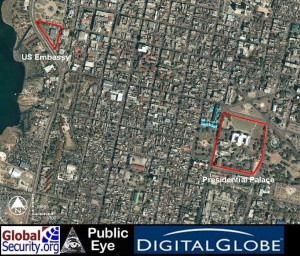
GeoChat emerged from a simple concept – can I send an SMS message and see it on a map?
From there the concept has evolved, and geochat has become a project to build a collaboration platform from the lowest common denominator communication tools, considering as highest priorities the needs of workers of humanitarian aid, international health and disaster response.
The main drivers for the project are the feedback of the InSTEDD programs in South East Asia, exercises such as GoldenShadow, and a growing community of humanitarian and health workers who spend their days in technologically austere environments. We invite anyone from any line of work to use and contribute user experience, technical, and any other kind of feedback.
Phi Beta Iota: InSTEDD [Innovative Support to Emergencies Diseases Disasters] is blessed with the participation of Cdr Eric Rasmussen, USN, a co-founder of STRONG ANGEL which has been allowed to die for all the wrong reasons. He and Dr. Dr. Dave Warner are pioneers in M4IS2 [Multinational Multiagency Multidisciplinary Multidomain Information-Sharing and Sense-Making.] See also UNICEF's RapidSMS.

 HACKERS ON PLANET EARTH (HOPE)
HACKERS ON PLANET EARTH (HOPE) Phi Beta Iota: Hackers are like astronauts, pushing the bleeding edge of the envelope. If the US Government had listened to us in 1991-1994, cyberspace would be secure today, and we would not be spending $12 billion a year on the cyber-scam game–outsourcing to beltway bandits fighting for the 100 folks that actually know how to do this stuff and can qualify for clearances. Our solution for the regional networks is gong to be multinational and open everything. This event is specifically recommended for young teens who show signs of intelligence and curiosity, and for mid-career officers beginning to realize that 80% of what they do is without merit, seeking a better way. This is where we do the right things righter, not the wrong things righter.
Phi Beta Iota: Hackers are like astronauts, pushing the bleeding edge of the envelope. If the US Government had listened to us in 1991-1994, cyberspace would be secure today, and we would not be spending $12 billion a year on the cyber-scam game–outsourcing to beltway bandits fighting for the 100 folks that actually know how to do this stuff and can qualify for clearances. Our solution for the regional networks is gong to be multinational and open everything. This event is specifically recommended for young teens who show signs of intelligence and curiosity, and for mid-career officers beginning to realize that 80% of what they do is without merit, seeking a better way. This is where we do the right things righter, not the wrong things righter.





